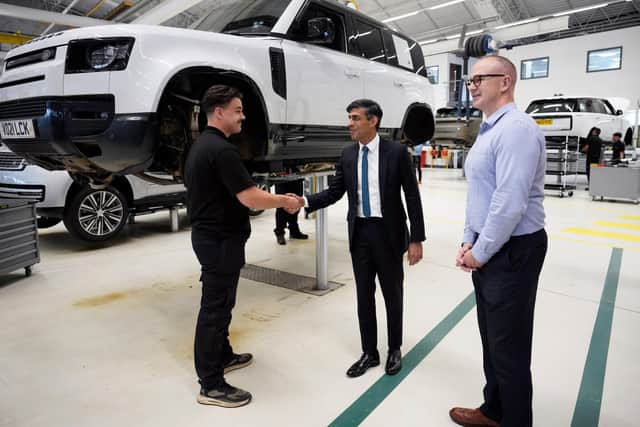After Rishi Sunak delayed ban on new petrol vehicles, SNP shouldn't have just rolled over – Dr Richard Dixon
Rishi Sunak may have gone backwards on the environment, but the SNP have been too quick to roll over on the ban on petrol and diesel vans. Despite delaying or scrapping a number of key commitments, Sunak claims that the UK can still meet its 2050 net-zero target, even though the government’s independent advisers say that’s “wishful thinking”, having already warned this summer that the UK needed to beef up its plans if it was to stay on track to meet the 2050 target.
While Sunak was grandstanding for the Daily Mail, our First Minister was at a United Nations’ climate summit in New York. His response to the changes being made by the Prime Minister was forthright and robust. But in one area the Scottish Government should have held firm, or at least firmer.
Advertisement
Hide AdAdvertisement
Hide AdIn 2017, the SNP government, announced a commitment to phasing out the need for petrol and diesel cars and vans by 2032, choosing that date because that’s when the current climate change plan runs out. They made this promise, even though at that time the UK Government had no similar commitment and they knew that they lacked the powers to actually prohibit the sale of these vehicles. The Scottish Government still can’t prohibit a company on the motor mile in Perth from selling a fossil-fuelled vehicle, nor prevent someone nipping over the border to buy a gas guzzler in Carlisle.
Their very carefully phrased wording about “phasing out the need for” was to show that this would be done by making the alternatives more attractive, by improving public transport, walking and cycling provision, by building up the EV charging network (now second only to London in chargers per person), and switching public vehicle fleets to electric. Since then they have also introduced low-emission zones, committed to reduce car traffic by 20 per cent by 2030, and promised emissions-free city centres (although they seem to have forgotten about this one again).
In 2020, Boris Johnson set a date for phasing out the sale of petrol and diesel cars and vans by 2035 and then, nine months later, increased this ambition to 2030 and so the Scottish Government moved their date to the same year.
The Labour party have said they will reinstate the 2030 date if they win the next UK election. This makes sense because the purchase price of electric cars is falling and is expected to reach parity with fossil-fuelled cars in only two or three years’ time. The running costs are already considerably lower. And major manufacturers like Volvo, BMW and the European arm of Ford are all phasing out fossil-fuelled models by 2030 or sooner.
Putting the UK date back again to 2035 should have meant the Scottish Government going back to plan A but instead the SNP immediately said basically if the UK Government isn’t doing it we aren’t doing it and opted for 2035.


But nothing has really changed since that 2017 commitment. Instead of giving in and invoking the spectre of the Internal Markets Act, the Scottish Government should have committed to reviewing when it can deliver on its original promise; 2030 might be a little too ambitious now, but the original target of 2032 is still within reach.
Dr Richard Dixon is an environmental campaigner and consultant
Comments
Want to join the conversation? Please or to comment on this article.